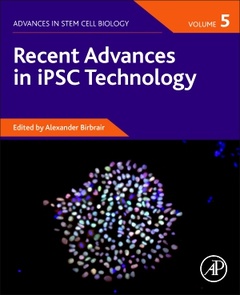Recent Advances in iPSC Technology Advances in Stem Cell Biology Series
Langue : Anglais
Coordonnateur : Birbrair Alexander

The series Advances in Stem Cell Biology is a timely and expansive collection of comprehensive information and new discoveries in the field of stem cell biology.Recent Advances in iPSC Technology, Volume 5 addresses the progress in induced pluripotent stem cells (iPSCs) technologies.Somatic cells can be reprogrammed into iPSCs by the expression of specific transcription factors. These cells are transforming biomedical research in the last 15 years. The volume teaches readers about current advances in the field. This book describes different technologies and strategies to use iPSCs for biological and clinical benefit. In recent years, remarkable progress has been made in the obtention of iPSCs and their differentiation into several cell types, tissues, and organs using state-of-the-art techniques. These advantages facilitated identification of key targets and definition of the molecular basis of several disorders. This volume will cover hot topics in the iPSC field, such as iPSCs for modeling the cardiovascular toxicities of anticancer therapies, iPSC differentiation through the lens of the noncoding genome, modeling of blood?brain barrier with iPSCs, mathematical modeling of iPSCs, iPSCs to study human brain evolution, selfrenewal in iPSCs, differences and similarities between iPSCs and embryonic stem cells, and more.The volume is written for researchers and scientists interested in stem cell therapy, cell biology, regenerative medicine, and organ transplantation and is contributed by world-renowned authors in the field.
1. Modeling the Cardiovascular Toxicities of Anticancer Therapies in the Era of Precision Medicine
2. Looking at Induced Pluripotent Stem Cell (iPSCs) Differentiation Through the Lens of The Non-Coding Genome
3. In Vitro Blood-Brain Barrier Model Derived from Human Ips Cells and Its Applications
4. The Progress in The Study of Reprogramming to Acquire the Features of Stem Cells In iPSCs and Cancers
5. An Introduction to The Mathematical Modelling of iPSCs
6. Use of iPSCs-Derived Brain Organoids to Study Human Brain Evolution
7. Self-Renewal in Induced Pluripotent Stem Cells
8. Strategies for iPSCs Expansion
9. An Overview of Reprogramming Approaches to Derive Integration-Free Induced Pluripotent Stem Cells for Prospective Biomedical Applications
10. Induced Pluripotent Stem Cells Versus Embryonic Stem Cells: A Comprehensive Overview of Differences and Similarities
2. Looking at Induced Pluripotent Stem Cell (iPSCs) Differentiation Through the Lens of The Non-Coding Genome
3. In Vitro Blood-Brain Barrier Model Derived from Human Ips Cells and Its Applications
4. The Progress in The Study of Reprogramming to Acquire the Features of Stem Cells In iPSCs and Cancers
5. An Introduction to The Mathematical Modelling of iPSCs
6. Use of iPSCs-Derived Brain Organoids to Study Human Brain Evolution
7. Self-Renewal in Induced Pluripotent Stem Cells
8. Strategies for iPSCs Expansion
9. An Overview of Reprogramming Approaches to Derive Integration-Free Induced Pluripotent Stem Cells for Prospective Biomedical Applications
10. Induced Pluripotent Stem Cells Versus Embryonic Stem Cells: A Comprehensive Overview of Differences and Similarities
Dr. Alexander Birbrair received his bachelor’s biomedical degree from Santa Cruz State University in Brazil. He completed his PhD in Neuroscience, in the field of stem cell biology, at the Wake Forest School of Medicine under the mentorship of Osvaldo Delbono. Then, he joined as a postdoc in stem cell biology at Paul Frenette’s laboratory at Albert Einstein School of Medicine in New York. In 2016, he was appointed faculty at Federal University of Minas Gerais in Brazil, where he started his own lab. His laboratory is interested in understanding how the cellular components of different tissues function and control disease progression. His group explores the roles of specific cell populations in the tissue microenvironment by using state-of-the-art techniques. His research is funded by the Serrapilheira Institute, CNPq, CAPES, and FAPEMIG. In 2018, Alexander was elected affiliate member of the Brazilian Academy of Sciences (ABC), and, in 2019, he was elected member of the Global Young Academy (GYA), and in 2021, he was elected affiliate member of The World Academy of Sciences (TWAS). He is the Founding Editor and Editor-in-Chief of Current Tissue Microenvironment Reports, and Associate Editor of Molecular Biotechnology. Alexander also serves in the editorial board of several other international journals: Stem Cell Reviews and Reports, Stem Cell Research, Stem Cells and Development, and Histology and Histopathology.
- Provides overview of the fast-moving field of induced pluripotent stem cell technology, regenerative medicine, and therapeutics
- Covers the following topics: iPSCs for modeling the cardiovascular toxicities of anticancer therapies, iPSC differentiation through the lens of the non-coding genome, modeling of blood-brain barrier with iPSCs, mathematical modelling of iPSCs, iPSCs to study human brain evolution, self-renewal in iPSCs, differences and similarities between iPSCs and embryonic stem cells, and more
- Contributed by world-renown experts in the field
Date de parution : 04-2021
Ouvrage de 334 p.
19x23.3 cm
Thème de Recent Advances in iPSC Technology :
Mots-clés :
Stem Cells; Regenerative Medicine; Pancreas; Stomach; Lungs; Testis
© 2024 LAVOISIER S.A.S.



